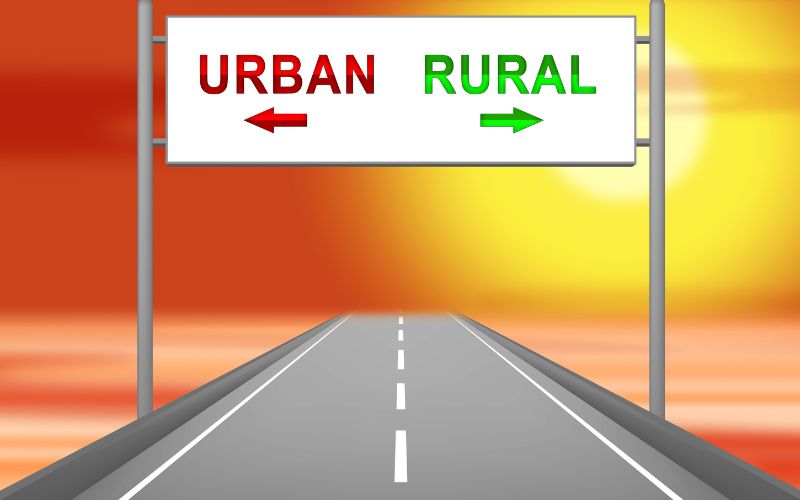
In the eternal debate of urban living versus rural life, one thing is certain – each lifestyle comes with its own set of advantages and disadvantages. Whether you’re a city slicker drawn to the hustle and bustle of urban landscapes or a nature lover seeking tranquility in the countryside, understanding the pros and cons of both choices can help you make an informed decision about where to call home. Let’s delve into the world of urban living and rural life to explore what each has to offer.
Urban Living: The Beat of the City
Pros:
- Endless Opportunities: Cities are vibrant hubs of innovation, commerce, and culture. Urban areas offer a wide array of job opportunities across industries, making it easier to find employment that aligns with your skillset and aspirations.
- Cultural Diversity: Urban centers are melting pots of cultures, languages, and traditions. Living in a city exposes you to diverse viewpoints, cuisines, and art forms, enriching your perspective on the world.
- Convenience and Amenities: From 24/7 supermarkets to entertainment venues, urban living provides unmatched convenience. Access to healthcare facilities, educational institutions, and recreational activities is often just a stone’s throw away.
- Public Transportation: Public transit systems in cities make commuting more efficient and eco-friendly. This can significantly reduce the need for personal vehicles and contribute to a decrease in overall pollution.
- Networking Opportunities: The densely populated urban environment fosters networking and socializing. It’s easier to connect with like-minded individuals, attend events, and collaborate on projects that can boost personal and professional growth.
Cons:
- Cost of Living: The allure of the city often comes with a hefty price tag. High rents, property costs, and general living expenses can strain your budget.
- Noise and Pollution: Urban areas are synonymous with noise pollution and poor air quality. The constant sounds of traffic and construction, along with polluted air, can take a toll on mental and physical well-being.
- Crowded Spaces: While the urban density brings opportunities, it also means crowded public spaces, long queues, and a lack of personal space.
- Stress and Fast-Paced Lifestyle: The fast-paced urban lifestyle can lead to increased stress levels. The constant rush to keep up with work, social obligations, and personal goals can be overwhelming.
- Limited Green Spaces: While cities offer parks and recreational areas, they might not compare to the wide-open spaces available in rural areas.

Rural Life: Embracing Nature’s Tranquility
Pros:
- Peace and Quiet: Rural life offers respite from the noise of urban living. The serene environment allows for relaxation, reduced stress, and a closer connection to nature.
- Cleaner Air and Environment: Away from industrial zones, rural areas generally boast cleaner air and a healthier environment, contributing to improved respiratory health and overall well-being.
- Strong Sense of Community: Smaller populations in rural areas often foster strong community bonds. Neighbors tend to know each other well, offering support and a sense of belonging.
- Affordable Living: The cost of living in rural areas is generally lower. Housing is more affordable, and daily expenses can be significantly reduced.
- Ample Outdoor Activities: If you’re a fan of outdoor adventures, rural areas offer a plethora of options – from hiking and camping to fishing and horseback riding.
Cons:
- Limited Job Opportunities: Rural areas typically have fewer job openings, especially in specialized industries. This might require longer commutes or reliance on remote work opportunities.
- Reduced Access to Services: Medical facilities, educational institutions, and entertainment venues are often fewer and farther between in rural settings, necessitating travel to urban areas for these services.
- Isolation: While a strong sense of community exists, rural living can also lead to feelings of isolation, especially if you’re used to the social interactions and events available in urban settings.
- Technological Limitations: Rural areas might experience slower internet speeds and limited access to advanced technologies, which could impact remote work and communication.
- Limited Cultural Offerings: Rural areas might lack the diversity and cultural attractions found in cities, which can be a downside for individuals seeking exposure to different cultures.
Making the Choice: Your Lifestyle, Your Decision
The choice between urban living and rural life ultimately depends on your personal preferences, priorities, and values. If you thrive in a fast-paced environment with numerous opportunities, the city might be your ideal destination. On the other hand, if you cherish tranquility, a stronger connection to nature, and a tight-knit community, rural living could be the perfect fit.
Consider your career aspirations, family needs, social preferences, and the kind of environment that brings you the most joy. Remember, there’s no one-size-fits-all answer – what matters most is finding the balance that aligns with your unique lifestyle.
Whether you choose to embrace the vibrant rhythms of the city or the soothing melodies of rural life, each path has its own beauty and challenges. Whichever you decide, make it a choice that enriches your life and brings you happiness every day.



